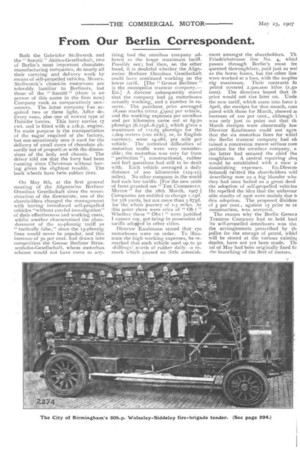From Our Berlin Correspondent,
Page 6

If you've noticed an error in this article please click here to report it so we can fix it.
Both the Gebrtider Stollwerck and the " Sarotti " Aktien-Gesellschaft, two of Berlin's most important chocolatemanufacturing companies, do nearly all their carrying and delivery work by means of self-propelled vehicles. Messrs. Stolhk-crck's closed-in motorvans are tolerably familiar to Berliners, but those of the " Sarotti " (there is no person of this name in the firm now) Company rank as comparatively newcomers. The latter company baS acquired two or three light, Adler delivery vans, also one of newest type of Daimler lorries. This lorry carries 17 cwt. and is fitted with a 22h.p. engine. Its main purpose is the transportation of the sugar required at the factory, but one occasionaly sees it used for the delivery of small cases of chocolate absurdly out of propartiun with the dimensions of the body and chassis. The driver told me that the lorry had been running since Christmas without having given the slightest trouble. The back wheels have twin rubber tires.
On May 8th, at the first general meeting of the Aligemeine Berliner Omnibus Gesellschaft since the reconstruction of the directorate, one of the shareholders charged the management with having introduced self-propelled vehicles "without careful investigation" of their effectiveness and working costs, whilst another characterised the abandonment of the lo-pfennig tariff as " tactically false," since the ts-pfennig lines would never be popular, and this increase of so per cent, had drawn into competition the Grosse Berliner Strassenbahn-Gesellschaft, whose _motorbus scheme would not have come to any thing had the omnibus company adhered to the lower maximum tariff. Possibly not; but then, on the other hand, it is doubtful whether the Allgeineine Berliner Omnibus Gesellschaft could have continued working on the lower tariff. [The Grosse Berliner " is the monopolist tramcar company.— Eu.] A director subsequently stated that the company had 54 motorbuses actually working, and a number in reserve. The purchase price overaged i8,000 marks (circa ,4;goo) per vehicle, and the working expenses per omnibus and per kilometre came out at 65-70 pfennigs (8.125d.-8.75d.), which gives a maximum of 112.63 pfennigs for the 1,609 metres (one mile), or, in English currency, some 14.o8d. per mile per vehicle. The technical difficulties of motorbus traffic were very considerable; the motorbus was very far from " perfection "; constructional, rubber and fuel questions had still to be dealt with. Each vehicle averaged a daily distance of 200 kilometres (124-125 miles). No other company in the world had such low tariffs. [For the new scale of fares granted see " THE COMMERCIAL MOTOR for the 28th March, 1907.] Companies are entitled to charge 1.25d, for 328 yards, but not more than I.875d. for the whole journey of 2-3 miles. At this point there were cries of " Oh " Whether these " Ohs 1 " were justified 1 cannot say, not being in possession of tariffs acloNted in other cities.
Director Kaufmann stated that 17o motorbuses were on order. To illustrate the high working expenses, he remarked that each vehicle used up to 30 shillin,g-s!: worth of rubber daily—a remark which ,caused no little astonish ment amongst the shareholders. Th Friedrichstrasse line No. 4, whicl passes through Berlin's most .fre quented thoroughfare, paid just as wel as the horse buses, but the other line were worked at a loss, with the io-pfen nig maximum. Their contracts fo petrol covered 2,500,000 kilos (2,501 tons). The directors hoped that tb price would not rise later on. Unde the new tariff, which came into force ii April, the receipts for that month, corn pared with those for March, showed al increase of too per cent., although i was only just to point out that tb March receipts were abnormally low Director Kaufmann could not agre that the six motorbus lines for whiel the Berlin tramcar company had oh tamed a concession meant serious corn petition for the omnibus company, a the latter had secured the chief tho roughfares. A central repairing shoj would be established with a view ti diminishing expenses. Ex-Directo Schmoll twitted the shareholders witl describing now as a big blunder wha they had once hailed as a great deed the adoption of self-propelled vehicles He repelled the idea that the unfavour able results of 1906 were mainly due t( this adoption. The proposed aividen( of 5 per cent., against 1.5 prior to re construction, was accepted.
The reason why the Berlin Genera Tramcar Company had to hold badl its self-propelled omnibuses was tha the arrangements 'prescribed by th, police for the storage of petrol, whicI will be stored at the various existin dep&s, have not yet been made. Thi 1st of May had been originally fixed fo. the launciiing of the fleet of motors.






























